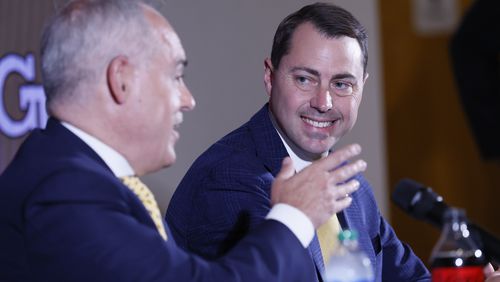From his office in the Wardlaw Center inside Bobby Dodd Stadium, J Batt is surrounded by newness, newness already realized and newness still to be imagined and actualized.
Batt recently sat down with The Atlanta Journal-Constitution inside that office on the same day a Hyundai IONIQ 5 was lifted by crane into the corner of Bobby Dodd Stadium and on the same day that a new Hyundai sign was put in place – Bobby Dodd Stadium now officially is Bobby Dodd Stadium at Hyundai Field. Both of those happenings are significant to the breezes of change wafting over the Flats.
About one month out from his one-year anniversary of being hired as Georgia Tech’s athletic director, Batt has fit a handful of headline-making moves into his first 11 months. Life as a busy AD hasn’t even left him any time to adorn his office walls with framed pictures and notable achievements from his relatively young career in college athletics.
While the Tech football team practices below on historic Grant Field in preparation for its home opener, Batt sips on a cup of coffee – he’s not sure how much he already has had by mid-morning – and, if nothing else, speaks with great passion about the state, and the future, of his athletics program.
It’s a program undoubtedly at a crossroads in the school’s history.
“We’re gonna win. That is the expectation,” Batt said. “This is Georgia Tech. We’re going to have incredible students who do incredible work in the classroom. We have one of the most unbelievable legacies of student preparedness from our Total Person Program that (former Tech AD) Homer Rice started. We’re going to continue to do that well. But we’re gonna win ballgames. Comprehensively.
“I think setting that standard again – in some ways we’re a little bit of where Homer Rice was when he got here. He came in the late (1970s), he had to garner alignment, he had to raise dollars and the outcome of that successful effort was an unprecedented period of winning, to see Georgia Tech win a national championship in football, go to Final Fours. I don’t think that’s unattainable.”
Batt, known as Jason Batt as a youth in Charlottesville, Virginia, before going by Jay Batt as a goalkeeper for North Carolina at the turn of the century, has not sat in his new office idly since his October hiring. He has hired two coaches for two of Tech’s most visible sports, fostered a corporate partnership with Hyundai that included a naming-rights deal for Bobby Dodd Stadium, reimagined football game days with a plan to close North Avenue before kickoff and is guiding Tech into a new age of ACC competition that will send the Yellow Jackets as far as California for regular-season conference games.
The 41-year-old, previously the executive deputy athletics director at Alabama, came to Atlanta because of a word and theme he uses often: alignment. Batt said there is alignment between Tech’s athletic department, Tech president Angel Cabrera, the University System of Georgia, influential alumni and donors on where Tech currently sits and what needs to be done to return its major sports to an elite level.
That’s a level that seems like a distant memory.
“At the end of the day, if winning is key, which it absolutely is here, our recent success hasn’t measured up,” Batt said. “National prominence for Georgia Tech athletics is not foreign, nor unachievable. Our goal is to regain that.”
The financial piece of the puzzle clearly has been an emphasis from Day 1. Batt said revenue generation is a daily focus and that Tech will explore any opportunities that are available.
He also expects Tech’s school record $128 million athletics budget for the 2023-24 fiscal year to grow even larger in the coming years and that he’s confident there is a clear understanding across the board that for the Jackets to compete for success there must be a championship-level of commitment to funding resources.
Batt discusses these topics while sitting 100 yards away from the Edge Center, a building whose days are numbered.
Destruction will begin, at the earliest, later this year of the building that currently houses offices for Tech coaches, staff and administrators. In its place will rise the Student Athlete Performance Center, a 96,000 square-foot facility that Batt said will provide future Jackets with spaces for strength and conditioning, sports medicine, recovery, mental health, nutrition, sports science and sports analytics.
The building also will be a big lift to the football program. Its offices, meeting rooms, video department and team spaces will be housed there.
Batt hinted the SAPC isn’t the only facilities project on the immediate horizon.
“We’ve begun the planning process for some comprehensive renovations,” he said. “This facility that we’re sitting in, Bobby Dodd, will certainly be at the top of the list. We want to provide an enhanced game-day experience, enhanced premium-seating options, and do so in a thoughtful manner. We’ll want to do it as part of a comprehensive approach to our facilities across the board.
“I’ll tell you that planning process has begun. Long way to go to get to all those different needs, but we’ve begun to approach that. It’s important.”
In November, Batt hired Brent Key to take over the football program, giving the former Tech offensive lineman a five-year, $15-million contract. In March, Batt let go of Josh Pastner and brought in Damon Stoudamire to try to revamp the men’s basketball program. Stoudamire also was given a five-year contract and will receive $2.1 million for his first season in charge.
Batt’s tenure, ultimately, will be judged on how Stoudamire’s and Key’s programs fare. The football team has been to only two bowl games, and only won one, since 2015, and the basketball team hasn’t made it past the second round of the NCAA Tournament since its championship-game appearance in 2004.
“My expectation is that we build their programs back to the place that our fan base expects, which is to be about the right things, to build it the right way, to continually improve,” Batt said. “Georgia Tech and Georgia Tech athletics have been built on hard work and discipline and toughness for so long, restoring a lot of that, I have expectations (Key and Stoudamire will) do that, and I have supreme confidence that they’re going to be able to get those programs back to the spot that they deserve.”
The 10th full-time athletic director in Tech history, Batt himself is on a contract of five years. How Tech is viewed now, nearly 12 months into that contract, and how it is perceived by 2027 will be a crucial part of the Batt legacy.
Batt certainly seems poised to make sure that legacy is revered in a positive light.
“I think that everybody understands that college athletics requires additional resources to be competitive and that we’re aligned to be competitive at the highest level,” he said. “Championships require championship-level resources. That’s not a secret, but at the end of the day, it is a point of emphasis for us.”
About the Author







